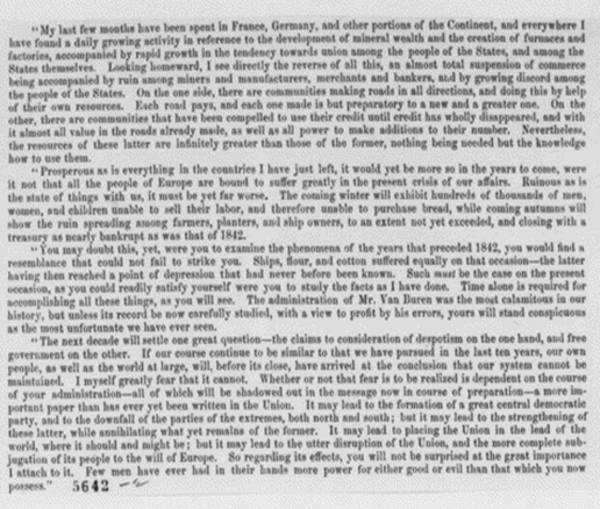The Real Cause of the U.S. Civil War
Henry C. Carey to Abraham Lincoln, January 2, 1861
Page 5: An Excerpt from Carey's 1857 Letter to Buchanan
My last few months have been spent in France, Germany, and other portions of the Continent, and everywhere I have found a daily growing activity in reference to the development of mineral wealth and the creation of furnaces and factories, accompanied by rapid growth in the tendency towards union among the people of the states, and among the States themselves. Looking homeward, I see directly the reverse of all this, an almost total suspension of commerce being accompanied by ruin among miners and manufacturers, merchants and bankers, and by growing discord among the people of the States. On the one side, there are communities making roads in all directions, and doing this by help of the own resources. Each road pays, and each one made is but preparatory to a new and a greater one. On the other, there are communities that have been compelled to use their credit until credit has wholly disappeared, and with it almost all value in the roads already made, as well as all power to make additions to their number. Nevertheless, the resources of these latter are infinitely greater than those of the former, nothing being needed but the knowledge how to use them.
Prosperous as is everything in the countries I have just left, it would yet be more so in the years to come, were it not that all the people of Europe are bound to suffer greatly in the present crisis of our affairs. Ruinous as is the state of things with us, it must be yet far worse. The coming winter will exhibit hundreds of thousands of men, women, and children unable to sell their labor, and therefore unable to purchase bread, while coming autumns will show the ruin spreading among farmers, planters, and ship owners, to an extent not yet exceeded, and closing with a treasury as nearly bankrupt as was that of 1842.
You may doubt this, yet, were you to examine the phenomena of the years that preceded 1842, you would find a resemblance that could not fail to strike you. Ships, flour, and cotton suffered equally on that occasion-the latter having then reached a point of depression that had never before been known. Such must be the case on the present occasion, as you could readily satisfy yourself were you to study the facts as I have done. Time alone is required for accomplishing all these things, as you will see. The administration of Mr. Van Buren was the most calamitous in our history, but unless its record be now carefully studied, with a view to profit by his errors, your will stand conspicuous as the most unfortunate we have ever seen.
The next decade will settle one great question-the claims to consideration of despotism on the one hand, and free government on the other. If our course continue to be similar to that we have pursued in the last ten years, our own people, as well as the world at large, will, before its close, have arrived at the conclusion that our system cannot be maintained. I myself greatly fear that it cannot. Whether or not that fear is to be realized is dependent on the course of your administration-all of which will be shadowed out in the message now in course of preparation-a more important paper than has ever yet been written in the Union. It may lead to the formation of a great central democratic party, and to the downfall of the parties of the extremes, both north and south; but it may lead to the strengthening of these latter, while annihilating what yet remains of the former. It may lead to placing the Union in the lead of the world, where it should and might be; but it may lead to the utter disruption of the Union, and the more complete subjugation of its people to the will of Europe. So regarding its effects, you will not be surprised at the great importance I attach to it. Few men have ever had in their hands more power for either good or evil than that which you now possess."
[5642]

Original documents at the Abraham Lincoln Papers Collection, Library of Congress
http://memory.loc.gov/ammem/alhtml/malhome.html